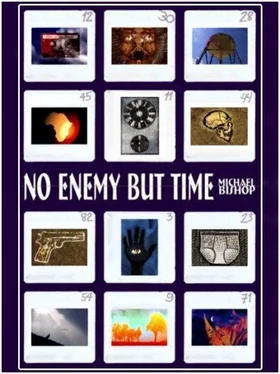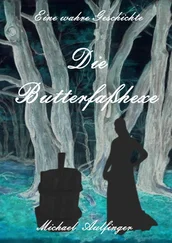He must have assumed that his selection to our program constituted a formal accusation of sorcery. On the other hand, he may actually have been guilty of poisoning someone or practicing witchcraft. As a result, his guilt combined with the trauma of weightlessness simulation to punish him for his crimes. Not only are our trainees brave, they are virtuous.”
“I reckon so,” Joshua said.
“What about you, Mr. Kampa? You modestly downplay your own bravery, which must be considerable—but are you virtuous?”
“Virtuous?”
Everyone in the hutch, including Alistair Patrick Blair, was looking at him. Was he virtuous?
“Pardon me, Mzee. I’m not sure how to answer. I voted Democratic in the last two presidential elections.”
Mutesa David Christian Ghazali Tharaka patted Joshua’s hand; whether in tribute or consolation was not clear. They watched four more barrel races before the President wearied of the show and returned with his retinue to Marakoi.
“You made a good impression,” Blair had told Joshua on the way back to his barracks.
“How?”
“Perhaps by preserving your sang-froid when you caught sight of his ceremonial attire. Besides, he’s always been partial to Americans.”
* * *
Yes, sang-froid. That was what he would require now, for Kaprow’s omnibus was prowling the lake margin (the lunar battlement of the Rift’s western wall like a mirage on their left), and tomorrow morning he would be playing chrononaut for keeps. Joshua’s stomach knotted, and the jumbled slide show of his past clicked away inside his mind with every jolt of The Machine’s balloonlike tires. This was his mission.
He had finally got it, or it had got him, and his entire life had been pointing toward this place and this time.
A time that encompassed an infinity of moments. An infinity of possibilities.
“You all right?” Kaprow asked, wrestling with the steering wheel. “You’ve been mighty quiet.”
“He’s anticipating the morrow,” Blair put in.
“More than that,” Joshua confessed. “Lots more than that.”
A Gift from the Ashes
Thestorm broke over Shangri-la and soon enveloped the entire mountain in its shroud. I squatted beside my wife and daughter in Guinevere’s hovel, in the sting of the astringent rain, and tried to sort out my fragmented emotions. News of the birth had spread through our encampment, even to those who had been sleeping, and while I watched my Helen struggle futilely against the stealthy machinations of death, every Minid in our band passed by her resting place—her makeshift bier—to see the baby. I could not pinpoint the moment of her dying, for she went without a wince or a murmur, the victim of lacerations and internal hemorrhaging, having exerted the last reserves of her strength to force our daughter into the impersonal slaughterhouse of the world; and the rain, the cleansing and astringent rain, had distanced me from the full intensity of her suffering.
“She’s dead!” I shouted at Alfie, Guinevere, and the others. “Goddamn it, I think she’s dead!”
I did not look to see what their reaction was. I turned my attention to the issue of Helen’s womb.
Despite our daughter’s pale skin and greedy suckling at her mother’s breast, I began to feel a powerful affection for her, a desire to comfort and protect. I took her into my arms and sheltered her from the pounding rain.
The storm passed over us, moving seaward. Dawn broke bright and cool. Several of the Minids greeted it with song.
But I could not understand the persistence of thunder on so fine a morning. The habilines were quicker than I to deduce the answer, to identify the source of this noise, and their gathering panic finally opened my eyes to what was happening.
The thunder was not overhead but underfoot.
Like a boiler full of clabbered tapioca, Mount Tharaka was churning inside, its sticky contents threatening to burst, brim, and overflow. The thunderstorm, along with the confusion attending the birth of the Grub, had disguised from us the mountain’s premonitory rumblings—but now, all too plainly, we could hear and feel them. The higher the sun mounted the more pronounced and emphatic these warnings.
We began to make preparations to leave Shangri-la, and our preparations included the manufacture of a travois on which to place my wife’s body. I was hurriedly trying to tie together the frame for this sledge when Mount Tharaka’s highest peak flew apart like a gigantic tooth dealt a shattering hammer blow.
I pitched to the ground. Foliage blocked my view of the summit, but above this line of foliage a billow of smoke and ash climbed into the sky, twisted in the air, and drifted downwind like the fallout from Death’s powder puff.
Another explosion wracked the mountain.
Below our encampment Alfie and Malcolm were hooting frantically. Quite clearly from where I lay, only a few feet from Helen and the Grub, I could hear other habilines calling back and forth across the ridge. I turned on my side and saw Guinevere hurrying out of her windbreak and down a worn footpath toward the men.
Emily, Fred, and Nicole next came scurrying past me, and Nicole was carrying A.P.B., whose eyes were fixed over his mother’s shoulder on the prodigious bonnet of ash cowling Mount Tharaka’s truncated peak. The ground was tilting and heaving even as they fled, and it occurred to me that I had only two possible courses of action: I could die with Helen or I could bid her farewell and perhaps save my life. And the Grub’s.
Kicking aside the struts of the unfinished travois, I threw myself into Guinevere’s shelter. There lay Helen. The Grub squirmed against her breasts, where I had placed the infant to free my hands for work.
About her neck my dead wife still wore the red bandanna that my sister Anna had given me in Cheyenne.
I unknotted it, wiped Helen’s forehead, and, after closing her lackluster eyes, tied the bandanna around my own neck. Another powerful explosion shook the mountain. Time was tightening like a noose.
“Come here, baby. Come to Poppa.”
I picked my daughter off Helen’s chest again and, cradling her in the crook of one arm, mouthed an incoherent goodbye to my lady. Then I darted out of the windbreak in desperate pursuit of the other Minids. The ridge sluiced with yellow mud, but I kept my balance and overtook the habilines in the very meadow where I had first learned that Helen was going to have a child.
Hot ash was showering down. From the vantage of the meadow it was evident that Mount Tharaka had blown away a good four to five hundred feet of its summit. Most of the smoke and soot—or at least the darkest plumes—trailed off to the east, while the sky directly above the mountain had the benighted look of a mirror draped with a black mantilla. Rivers of mud—of scorched tapioca—were oozing down the northwestern flank from the fractured summit, and several of these had already breached the timberline.
Chance and the mountain’s peculiar topography had diverted these floods away from Shangri-la, toward the citadel of Attila Gorilla and his unfortunate people. Unless they had been far more prescient than we, it was hard to imagine that they had escaped their lofty fastness.
Numb, the Minids and I walked away from Mount Tharaka. The men had clubs of one sort or another, but otherwise we had fled the volcano without any worldly goods. The Grub and Helen’s red bandanna were all I had salvaged from the catastrophe still unfolding behind us.
On the savannah elephants trumpeted and guinea fowl paced. The foremost concern of every creature was not to kill a fellow refugee for lunch but to put a healthy distance between itself and the angry mountain. Therefore our evacuation proceeded almost like a parade. We saw baboons abreast of us, unruffled ostriches sprinting into thorn brakes, and giraffids moseying along in self-possessed pairs. As for us, we seemed to be heading toward our old capital cities in the gentle hills east of Lake Kiboko.
Читать дальше



![Ally Carter - [Gallagher Girls 01] I'd Tell You I Love You But Then I'd Have to Kill You](/books/262179/ally-carter-gallagher-girls-01-i-d-tell-you-i-lo-thumb.webp)








